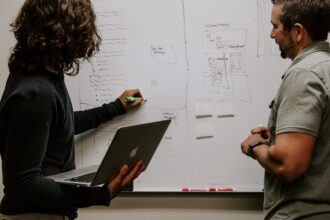Confirmation bias is a cognitive phenomenon that influences how you process information and form beliefs. It refers to the tendency to search for, interpret, and remember information in a way that confirms your pre-existing beliefs or hypotheses. This bias can lead you to overlook or dismiss evidence that contradicts your views, creating a skewed perception of reality.
Essentially, when faced with new information, you may unconsciously filter it through the lens of your existing beliefs, reinforcing what you already think rather than challenging it. This bias is not just a minor quirk of human thought; it can have significant implications for your understanding of the world. For instance, if you hold a particular political view, you might seek out news articles that support that stance while ignoring those that present opposing viewpoints.
This selective exposure can create echo chambers, where your beliefs are amplified and any dissenting opinions are marginalized. As a result, confirmation bias can hinder your ability to engage in critical thinking and make informed decisions.
Key Takeaways
- Confirmation bias is the tendency to search for, interpret, favor, and recall information in a way that confirms one’s preexisting beliefs or hypotheses.
- The psychology behind confirmation bias involves the brain’s natural inclination to seek out information that aligns with existing beliefs and to ignore or dismiss information that contradicts them.
- Confirmation bias affects decision making by leading individuals to make choices that support their existing beliefs, even if those choices are not the most rational or logical.
- Perception plays a key role in confirmation bias, as individuals may interpret ambiguous information in a way that supports their existing beliefs.
- Examples of confirmation bias in everyday life include seeking out news sources that align with one’s political views and dismissing evidence that contradicts personal opinions.
- Confirmation bias can have a significant impact on relationships, leading individuals to dismiss or ignore the perspectives of others and causing conflict and misunderstanding.
- Overcoming confirmation bias requires actively seeking out diverse perspectives, being open to new information, and critically evaluating one’s own beliefs and assumptions.
- Confirmation bias in the media can lead to the spread of misinformation and the reinforcement of existing biases among audiences.
- Confirmation bias in politics and society can lead to polarization, division, and the perpetuation of false or misleading information.
- There is a link between confirmation bias and stereotyping, as individuals may seek out information that confirms their existing stereotypes and ignore evidence that challenges them.
- Recognizing and addressing confirmation bias is important for making informed decisions, fostering understanding and empathy, and promoting a more open and inclusive society.
The Psychology Behind Confirmation Bias
The roots of confirmation bias lie deep within the cognitive processes that govern how you think and learn. Your brain is wired to seek coherence and consistency in your beliefs, which can lead to a preference for information that aligns with what you already know. This psychological tendency is often linked to the concept of cognitive dissonance, which occurs when you experience discomfort due to conflicting beliefs or information.
To alleviate this discomfort, you may unconsciously gravitate toward information that reaffirms your existing views. Moreover, emotional factors play a significant role in confirmation bias. When you feel strongly about a particular belief, your emotions can cloud your judgment and lead you to favor information that resonates with those feelings.
This emotional investment can create a feedback loop, where your beliefs are continually reinforced by the information you choose to accept. Understanding the psychological mechanisms behind confirmation bias can help you recognize its presence in your own thought processes and encourage more balanced perspectives.
How Confirmation Bias Affects Decision Making
Your decision-making processes are often influenced by confirmation bias, sometimes without you even realizing it. When faced with choices, you may unconsciously seek out information that supports your preferred option while disregarding evidence that suggests otherwise. This can lead to poor decision-making, as you may overlook critical factors that could inform a more balanced choice.
For example, if you’re considering a major purchase, such as a car, you might focus on reviews that praise the model you’re interested in while ignoring negative feedback. In professional settings, confirmation bias can have even more pronounced effects. If you’re part of a team making strategic decisions, the tendency to favor information that aligns with existing beliefs can stifle innovation and creativity.
Team members may become entrenched in their viewpoints, leading to groupthink and a lack of diverse perspectives. Recognizing how confirmation bias operates in decision-making contexts is crucial for fostering an environment where critical thinking and open dialogue are encouraged.
The Role of Perception in Confirmation Bias
| Perception | Confirmation Bias |
|---|---|
| Process of organizing and interpreting sensory information | Tendency to search for, interpret, favor, and recall information in a way that confirms one’s preexisting beliefs |
| Can be influenced by past experiences, culture, and personal beliefs | Occurs when individuals selectively focus on evidence that supports their existing beliefs while ignoring contradictory evidence |
| Can lead to different interpretations of the same information | Can lead to the reinforcement of existing beliefs and the dismissal of opposing viewpoints |
Perception plays a pivotal role in how confirmation bias manifests in your life. Your individual experiences, cultural background, and personal beliefs shape the lens through which you view the world. This means that two people can interpret the same piece of information in vastly different ways based on their unique perspectives.
When you encounter new data or opinions, your perception filters this information, often leading you to favor interpretations that align with your existing beliefs. This perceptual filtering can create a feedback loop where your beliefs become increasingly entrenched over time. As you continue to seek out and accept information that confirms your views, your perception of reality becomes narrower and more distorted.
This narrowing can limit your ability to empathize with others or understand differing viewpoints, ultimately hindering meaningful conversations and relationships. By acknowledging the role of perception in confirmation bias, you can begin to challenge your own assumptions and broaden your understanding of complex issues.
Examples of Confirmation Bias in Everyday Life
You encounter confirmation bias in various aspects of everyday life, often without realizing it. For instance, consider how social media algorithms curate content based on your previous interactions. If you frequently engage with posts that align with your political beliefs, the algorithm will prioritize similar content in your feed.
This creates an environment where you’re continually exposed to ideas that reinforce your views while dissenting opinions are pushed aside. As a result, your understanding of current events may become increasingly one-dimensional. Another common example occurs in health-related discussions.
If you’re convinced that a particular diet is effective, you might only pay attention to success stories or research supporting that diet while ignoring studies that highlight its potential downsides. This selective attention can lead to misguided health choices and an inability to consider alternative approaches. Recognizing these everyday instances of confirmation bias is essential for fostering a more nuanced understanding of the world around you.
The Impact of Confirmation Bias on Relationships
Confirmation bias can significantly impact your relationships with others, often leading to misunderstandings and conflicts. When you hold strong beliefs about someone—whether positive or negative—you may unconsciously seek out behaviors or comments that confirm those beliefs. For example, if you believe a friend is unreliable, you might focus on instances where they fail to follow through on commitments while overlooking times when they have been dependable.
This selective perception can create a distorted view of the relationship and hinder effective communication. Moreover, confirmation bias can contribute to polarization within relationships, especially when discussing contentious topics such as politics or religion.
By recognizing how confirmation bias affects your relationships, you can work towards fostering empathy and understanding.
Overcoming Confirmation Bias
Overcoming confirmation bias requires conscious effort and self-awareness. One effective strategy is to actively seek out diverse perspectives and engage with information that challenges your beliefs. This might involve reading articles from sources with differing viewpoints or participating in discussions with individuals who hold contrasting opinions.
By exposing yourself to a variety of perspectives, you can broaden your understanding and develop a more nuanced view of complex issues. Another approach is to practice critical thinking by questioning your assumptions and evaluating evidence objectively. When confronted with new information, take a moment to reflect on how it aligns with your existing beliefs and consider whether it warrants further investigation.
Engaging in this reflective process can help you break free from the confines of confirmation bias and encourage more balanced decision-making.
Confirmation Bias in the Media
The media landscape is rife with examples of confirmation bias, as outlets often cater to specific audiences by presenting information that aligns with their viewers’ beliefs. This phenomenon can create echo chambers where individuals are only exposed to narratives that reinforce their existing views. For instance, news channels may emphasize stories that support particular political ideologies while downplaying or ignoring those that challenge them.
As a result, consumers of media may develop skewed perceptions of reality based on selective reporting. Moreover, social media platforms exacerbate confirmation bias by using algorithms designed to prioritize content that aligns with users’ interests and preferences. This creates an environment where individuals are continually bombarded with information that confirms their beliefs while dissenting voices are marginalized.
To navigate this landscape effectively, it’s essential for you to critically evaluate the sources of information you consume and seek out diverse viewpoints to counteract the effects of confirmation bias.
Confirmation Bias in Politics and Society
In the realm of politics and society, confirmation bias plays a significant role in shaping public opinion and discourse. When individuals align themselves with specific political parties or ideologies, they often become entrenched in their beliefs, seeking out information that supports their views while dismissing opposing arguments as biased or unfounded. This polarization can lead to an inability to engage in constructive dialogue or find common ground on important issues.
The impact of confirmation bias extends beyond individual beliefs; it can also influence collective behavior within communities and societies at large. For example, during election cycles, voters may gravitate toward candidates who echo their beliefs while disregarding those who present alternative perspectives. This dynamic can perpetuate divisions within society and hinder progress on critical issues such as climate change or social justice.
Recognizing the role of confirmation bias in political contexts is crucial for fostering more inclusive discussions and promoting understanding among diverse groups.
The Link Between Confirmation Bias and Stereotyping
Confirmation bias is closely linked to stereotyping, as both involve the tendency to favor information that aligns with pre-existing beliefs about individuals or groups. When you hold stereotypes about certain demographics—whether based on race, gender, or other characteristics—you may unconsciously seek out behaviors or traits that confirm those stereotypes while ignoring evidence that contradicts them. This selective perception reinforces harmful biases and perpetuates discrimination.
For instance, if you believe that a particular group is prone to certain negative behaviors, you might focus on instances that support this belief while overlooking positive contributions from individuals within that group. This not only distorts your understanding but also contributes to systemic inequalities within society. By recognizing the connection between confirmation bias and stereotyping, you can work towards challenging these biases and fostering more equitable interactions with others.
The Importance of Recognizing and Addressing Confirmation Bias
Recognizing and addressing confirmation bias is essential for personal growth and fostering healthy relationships with others. By becoming aware of how this cognitive phenomenon influences your thoughts and behaviors, you can take proactive steps toward cultivating a more open-minded approach to information and differing perspectives. This awareness allows you to engage in critical thinking and make more informed decisions based on a comprehensive understanding of complex issues.
Furthermore, addressing confirmation bias contributes to healthier social interactions by promoting empathy and understanding among individuals with differing viewpoints. By actively seeking out diverse perspectives and engaging in constructive dialogue, you can bridge divides and foster collaboration on important societal issues. Ultimately, recognizing confirmation bias empowers you to challenge assumptions, broaden your horizons, and contribute positively to both personal relationships and the larger community.
Understanding confirmation bias is crucial for developing critical thinking skills and making informed decisions. A related article that delves into this topic can be found on Unplugged Psych, a platform dedicated to exploring psychological concepts in an accessible manner. For a deeper insight into how confirmation bias affects our perception and decision-making processes, you can read more about it in this




